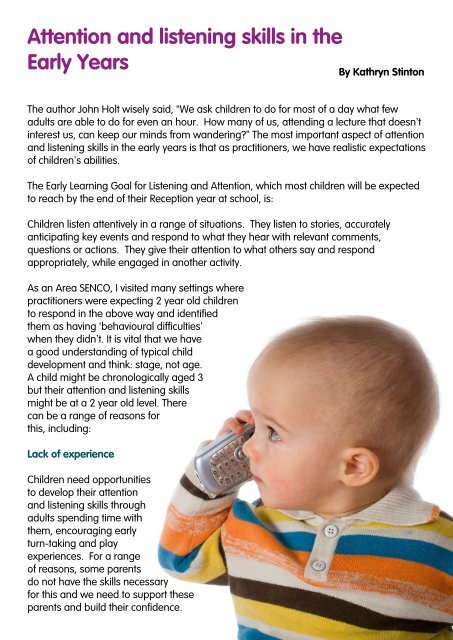Parenta Magazine Issue 14 January 2016 INT
Create successful ePaper yourself
Turn your PDF publications into a flip-book with our unique Google optimized e-Paper software.
Attention and listening skills in the<br />
Early Years<br />
By Kathryn Stinton<br />
The author John Holt wisely said, “We ask children to do for most of a day what few<br />
adults are able to do for even an hour. How many of us, attending a lecture that doesn’t<br />
interest us, can keep our minds from wandering?” The most important aspect of attention<br />
and listening skills in the early years is that as practitioners, we have realistic expectations<br />
of children’s abilities.<br />
The Early Learning Goal for Listening and Attention, which most children will be expected<br />
to reach by the end of their Reception year at school, is:<br />
Children listen attentively in a range of situations. They listen to stories, accurately<br />
anticipating key events and respond to what they hear with relevant comments,<br />
questions or actions. They give their attention to what others say and respond<br />
appropriately, while engaged in another activity.<br />
As an Area SENCO, I visited many settings where<br />
practitioners were expecting 2 year old children<br />
to respond in the above way and identified<br />
them as having ‘behavioural difficulties’<br />
when they didn’t. It is vital that we have<br />
a good understanding of typical child<br />
development and think: stage, not age.<br />
A child might be chronologically aged 3<br />
but their attention and listening skills<br />
might be at a 2 year old level. There<br />
can be a range of reasons for<br />
this, including:<br />
Lack of experience<br />
Children need opportunities<br />
to develop their attention<br />
and listening skills through<br />
adults spending time with<br />
them, encouraging early<br />
turn-taking and play<br />
experiences. For a range<br />
of reasons, some parents<br />
do not have the skills necessary<br />
for this and we need to support these<br />
parents and build their confidence.<br />
Hearing loss<br />
The newborn hearing screen helps to identify babies who have a permanent hearing loss<br />
but many children under 5 have glue ear, when fluid blocks the inner ear, resulting<br />
in an intermittent hearing loss. As early years practitioners, we have a vital role in<br />
supporting parents to arrange a hearing test for their child, either through their Health<br />
Visitor or GP.<br />
Developmental delay<br />
There can be many reasons for a child’s delayed development and although early years<br />
practitioners are required to recognise delays, they are not qualified to make any type of<br />
diagnosis. If you have concerns, complete your assessments and observations and share<br />
these with parents, working together to decide what should happen next.<br />
How can I support a child with limited attention and listening skills?<br />
1. Reduce distractions such as background music, staff talking or tidying during<br />
quieter times.<br />
2. Be aware of too much visual stimulation, such as hanging displays and open<br />
resources. Try sitting on the floor and seeing the environment from the child’s point<br />
of view.<br />
3. Gain the child’s attention by saying their name before giving an instruction<br />
4. Keep your instructions simple and use visual cues such as photos, objects<br />
and gestures<br />
5. Use the child’s interests to engage and motivate them<br />
6. Use music and sounds to signal transition times<br />
7. Have realistic expectations and give specific praise to children for listening well<br />
8. Sing songs using props such as puppets<br />
9. Model the attention and listening skills you want to see: children are always<br />
watching us, are you a good example of someone who attends and listens?<br />
If you are concerned about a child’s attention and listening skills and would like further<br />
advice, the national charity ICAN has an enquiry service. Call 020 7843 2544 to arrange<br />
a free phone call from one of their speech and language therapists, or you can email<br />
your questions to help@ican.org.uk.<br />
Kathryn is a specialist early years teacher and trainer who has worked with children for nearly 25<br />
years, including 10 years as an Area SENCO. She is a licensed Tutor for ICAN Talk Boost as well as<br />
an ELKLAN Speech and Language Trainer. She regularly writes and delivers courses for early years<br />
practitioners on all aspects of SEN. You can follow her on Twitter @kathrynstinton2 find her on<br />
Facebook or visit her website for more information.

















